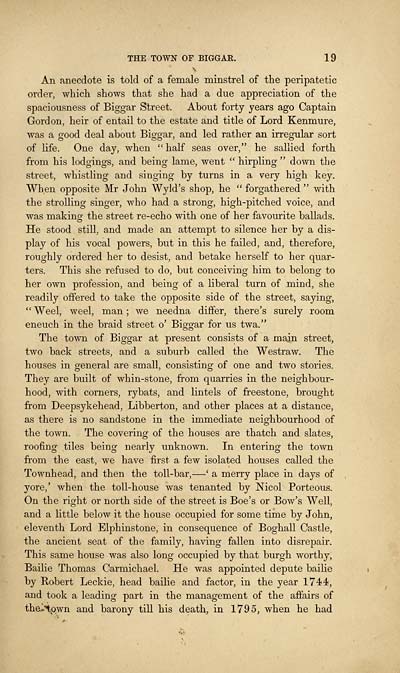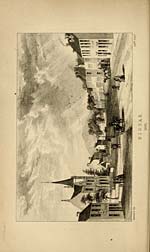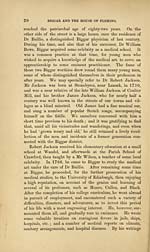Biggar and the House of Fleming
(39) Page 21
Download files
Complete book:
Individual page:
Thumbnail gallery: Grid view | List view

THE TOWN OF BIGGAE. 19
An anecdote is told of a female minstrel of the peripatetic
order, which shows that she had a due appreciation of the
spaciousness of Biggar Street. About forty years ago Captain
Gordon, heir of entail to the estate and title of Lord Kenmure,
was a good deal about Biggar, and led rather an irregular sort
of life. One day, when " half seas over," he sallied forth
from his lodgings, and being lame, went " hirpling " down the
street, whistling and singing by turns in a very high key.
When opposite Mr John Wyld's shop, he " forgathered " with
the strolling singer, who had a strong, high-pitched voice, and
was making the street re-echo with one of her favourite ballads.
He stood still, and made an attempt to silence her by a dis-
play of his vocal powers, but in this he failed, and, therefore,
roughly ordered her to desist, and betake herself to her quar-
ters. This she refused to do, but conceiving him to belong to
her own profession, and being of a liberal turn of mind, she
readily offered to take the opposite side of the street, saying,
" Weel, weel, man ; we needna differ, there's surely room
eneuch in the braid street o' Biggar for us twa."
The town of Biggar at present consists of a main street,
two back streets, and a suburb called the Westraw. The
houses in general are small, consisting of one and two stories.
They are built of whin-stone, from quarries in the neighbour-
hood, with corners, rybats, and lintels of freestone, brought
from Deepsykehead, Libberton, and other places at a distance,
as there is no sandstone in the immediate neighbourhood of
the town. The covering of the houses are thatch and slates,
roofing tiles being nearly unknown. In entering the town
from the east, we have first a few isolated houses called the
Townhead, and then the toll-bar, — ' a merry place in days of
yore,' when the toll-house was tenanted by Nicol Porteous.
On the right or north side of the street is Boe's or Bow's Well,
and a little below it the house occupied for some time by John,
eleventh Lord Elphinstone, in consequence of Boghall Castle,
the ancient seat of the family, having fallen into disrepair.
This same house was also long occupied by that burgh worthy,
Bailie Thomas Carmichael. He was appointed depute bailie
by Robert Leckie, head bailie and factor, in the year 1744,
and took a leading part in the management of the affairs of
theHqwn and barony till his death, in 1795, when he had
An anecdote is told of a female minstrel of the peripatetic
order, which shows that she had a due appreciation of the
spaciousness of Biggar Street. About forty years ago Captain
Gordon, heir of entail to the estate and title of Lord Kenmure,
was a good deal about Biggar, and led rather an irregular sort
of life. One day, when " half seas over," he sallied forth
from his lodgings, and being lame, went " hirpling " down the
street, whistling and singing by turns in a very high key.
When opposite Mr John Wyld's shop, he " forgathered " with
the strolling singer, who had a strong, high-pitched voice, and
was making the street re-echo with one of her favourite ballads.
He stood still, and made an attempt to silence her by a dis-
play of his vocal powers, but in this he failed, and, therefore,
roughly ordered her to desist, and betake herself to her quar-
ters. This she refused to do, but conceiving him to belong to
her own profession, and being of a liberal turn of mind, she
readily offered to take the opposite side of the street, saying,
" Weel, weel, man ; we needna differ, there's surely room
eneuch in the braid street o' Biggar for us twa."
The town of Biggar at present consists of a main street,
two back streets, and a suburb called the Westraw. The
houses in general are small, consisting of one and two stories.
They are built of whin-stone, from quarries in the neighbour-
hood, with corners, rybats, and lintels of freestone, brought
from Deepsykehead, Libberton, and other places at a distance,
as there is no sandstone in the immediate neighbourhood of
the town. The covering of the houses are thatch and slates,
roofing tiles being nearly unknown. In entering the town
from the east, we have first a few isolated houses called the
Townhead, and then the toll-bar, — ' a merry place in days of
yore,' when the toll-house was tenanted by Nicol Porteous.
On the right or north side of the street is Boe's or Bow's Well,
and a little below it the house occupied for some time by John,
eleventh Lord Elphinstone, in consequence of Boghall Castle,
the ancient seat of the family, having fallen into disrepair.
This same house was also long occupied by that burgh worthy,
Bailie Thomas Carmichael. He was appointed depute bailie
by Robert Leckie, head bailie and factor, in the year 1744,
and took a leading part in the management of the affairs of
theHqwn and barony till his death, in 1795, when he had
Set display mode to:
![]() Universal Viewer |
Universal Viewer | ![]() Mirador |
Large image | Transcription
Mirador |
Large image | Transcription
Images and transcriptions on this page, including medium image downloads, may be used under the Creative Commons Attribution 4.0 International Licence unless otherwise stated. ![]()
| Histories of Scottish families > Biggar and the House of Fleming > (39) Page 21 |
|---|
| Permanent URL | https://digital.nls.uk/94839750 |
|---|
| Description | A selection of almost 400 printed items relating to the history of Scottish families, mostly dating from the 19th and early 20th centuries. Includes memoirs, genealogies and clan histories, with a few produced by emigrant families. The earliest family history goes back to AD 916. |
|---|

